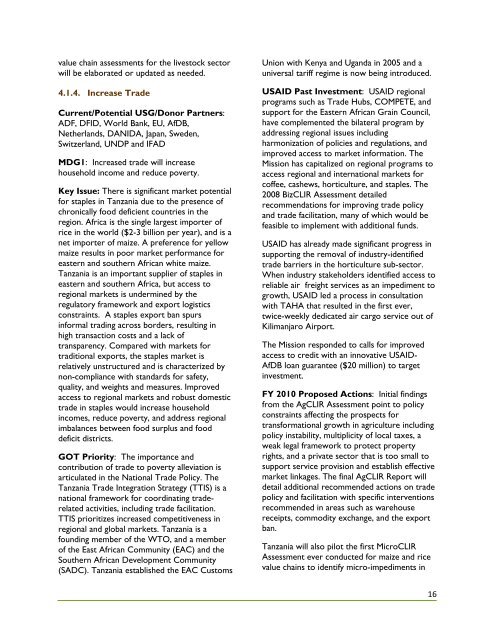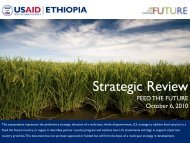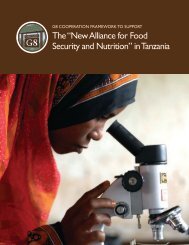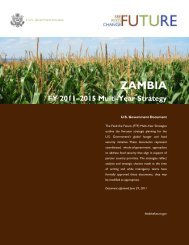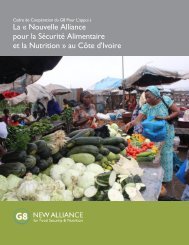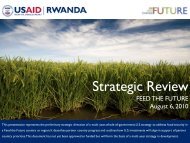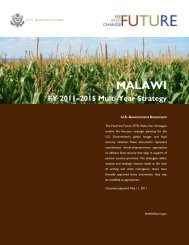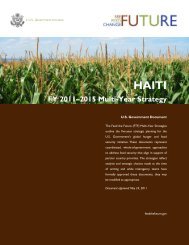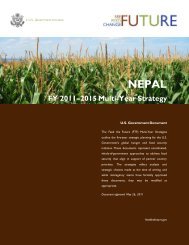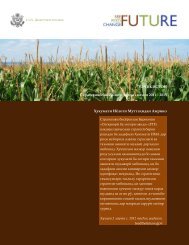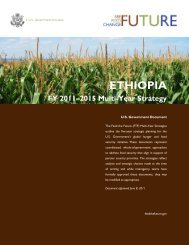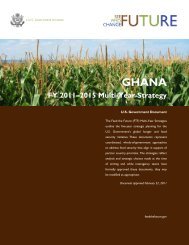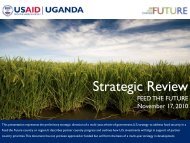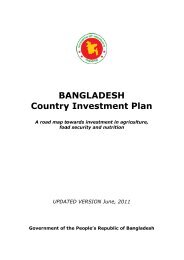Feed the Future FY 2010 Implementation Plan, Tanzania
Feed the Future FY 2010 Implementation Plan, Tanzania
Feed the Future FY 2010 Implementation Plan, Tanzania
- No tags were found...
Create successful ePaper yourself
Turn your PDF publications into a flip-book with our unique Google optimized e-Paper software.
value chain assessments for <strong>the</strong> livestock sectorwill be elaborated or updated as needed.4.1.4. Increase TradeCurrent/Potential USG/Donor Partners:ADF, DFID, World Bank, EU, AfDB,Ne<strong>the</strong>rlands, DANIDA, Japan, Sweden,Switzerland, UNDP and IFADMDG1: Increased trade will increasehousehold income and reduce poverty.Key Issue: There is significant market potentialfor staples in <strong>Tanzania</strong> due to <strong>the</strong> presence ofchronically food deficient countries in <strong>the</strong>region. Africa is <strong>the</strong> single largest importer ofrice in <strong>the</strong> world ($2-3 billion per year), and is anet importer of maize. A preference for yellowmaize results in poor market performance foreastern and sou<strong>the</strong>rn African white maize.<strong>Tanzania</strong> is an important supplier of staples ineastern and sou<strong>the</strong>rn Africa, but access toregional markets is undermined by <strong>the</strong>regulatory framework and export logisticsconstraints. A staples export ban spursinformal trading across borders, resulting inhigh transaction costs and a lack oftransparency. Compared with markets fortraditional exports, <strong>the</strong> staples market isrelatively unstructured and is characterized bynon-compliance with standards for safety,quality, and weights and measures. Improvedaccess to regional markets and robust domestictrade in staples would increase householdincomes, reduce poverty, and address regionalimbalances between food surplus and fooddeficit districts.GOT Priority: The importance andcontribution of trade to poverty alleviation isarticulated in <strong>the</strong> National Trade Policy. The<strong>Tanzania</strong> Trade Integration Strategy (TTIS) is anational framework for coordinating traderelatedactivities, including trade facilitation.TTIS prioritizes increased competitiveness inregional and global markets. <strong>Tanzania</strong> is afounding member of <strong>the</strong> WTO, and a memberof <strong>the</strong> East African Community (EAC) and <strong>the</strong>Sou<strong>the</strong>rn African Development Community(SADC). <strong>Tanzania</strong> established <strong>the</strong> EAC CustomsUnion with Kenya and Uganda in 2005 and auniversal tariff regime is now being introduced.USAID Past Investment: USAID regionalprograms such as Trade Hubs, COMPETE, andsupport for <strong>the</strong> Eastern African Grain Council,have complemented <strong>the</strong> bilateral program byaddressing regional issues includingharmonization of policies and regulations, andimproved access to market information. TheMission has capitalized on regional programs toaccess regional and international markets forcoffee, cashews, horticulture, and staples. The2008 BizCLIR Assessment detailedrecommendations for improving trade policyand trade facilitation, many of which would befeasible to implement with additional funds.USAID has already made significant progress insupporting <strong>the</strong> removal of industry-identifiedtrade barriers in <strong>the</strong> horticulture sub-sector.When industry stakeholders identified access toreliable air freight services as an impediment togrowth, USAID led a process in consultationwith TAHA that resulted in <strong>the</strong> first ever,twice-weekly dedicated air cargo service out ofKilimanjaro Airport.The Mission responded to calls for improvedaccess to credit with an innovative USAID-AfDB loan guarantee ($20 million) to targetinvestment.<strong>FY</strong> <strong>2010</strong> Proposed Actions: Initial findingsfrom <strong>the</strong> AgCLIR Assessment point to policyconstraints affecting <strong>the</strong> prospects fortransformational growth in agriculture includingpolicy instability, multiplicity of local taxes, aweak legal framework to protect propertyrights, and a private sector that is too small tosupport service provision and establish effectivemarket linkages. The final AgCLIR Report willdetail additional recommended actions on tradepolicy and facilitation with specific interventionsrecommended in areas such as warehousereceipts, commodity exchange, and <strong>the</strong> exportban.<strong>Tanzania</strong> will also pilot <strong>the</strong> first MicroCLIRAssessment ever conducted for maize and ricevalue chains to identify micro-impediments in16


